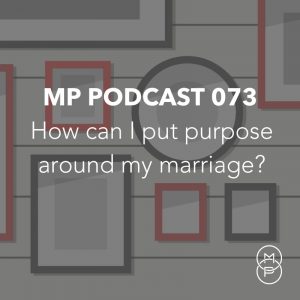 Links
Links
- Praying Circles Around Your Marriage on Amazon
- National Community Church
- Nina on Twitter
- Nina on Instagram
About Our Guest
For today’s episode, Ted sat down with Nina Schmidgall, the author of Praying Circles Around Your Marriage. Nina serves as Director of Family Ministry at National Community Church (NCC) in Washington DC. Nina’s husband, Joel, is the Executive Pastor at the church. Nina and Joel have been married for 15 years and live on Capitol Hill with their three kids.
I think most of us understand that purpose can be a powerfully important thing in any marriage. But it can be difficult to understand what that means for us practically. So to get a better idea of the role purpose can play in our marriage, take a listen to the conversation with Ted and Nina.
Interview
Can you tell our listeners about yourself?
I’m from Washington DC and work at National Community Church. I’m The Director of Family Ministry so I oversee ministry from birth to graduation and support parents as they’re intentional about faith in the home. My husband, Joel, is our executive pastor and together we do work with the couples we walk with.
There are a lot of young professionals in DC so for a long time our church was a lot of singles and young professionals. Now, many of them are getting married. So not only do we get to walk with couples as they prepare for marriage, but also as they run into things in marriage and are looking to navigate them.
I came to DC to work for Congress. Most people don’t realize how young the people who are running our country are. I worked on legislative issues advising the member that I worked for. I always worked on issues that affect the home—the family and education and things that families care about.
I did that for almost a decade and at the same time was part of this tiny church. Over time, as we launched locations and grew, I stepped out of my work in the government. But in some ways my work is very similar, I just do it through the church instead of the legislative system.
What’s unique about doing church and marriage ministry in DC?
Anything that any church or community is facing all over America—you magnify that and make it much louder in DC. Very passionate people live in DC and they carry that into a marriage. What we’ve found is many are hesitant about marriage because they fear it might keep them from doing what they’re passionate about. Or, they step into marriage with another passionate person and that eventually starts to pull against each other.
Another thing that’s unique about DC is that most people who live there are away from their own families. That creates something really beautiful for our church because the community that our church can offer is really beautiful.
How did you and your husband meet?
I grew up in an un-churched home. I had a blended home with a lot of remarriage and broken marriage. From a young age, I had a desire for a lifelong marriage. As I got to dating age, I was unsure if I had the tools for a healthy marriage.
On the other hand, Joel was a pastor’s kid and his parents had an incredible marriage. He had examples all around him of lifelong committed marriages. We dated for three years and did a lot of work on the front end. We did pre-engagement counseling, not just pre-marriage counseling.
We did that to work through our differences in background and history, but also our differences in personality. We are as different as night and day. We stepped into marriage as very different people with very different backgrounds that we had to work through.
What’s it like for a couple to have competing visions?
For one, it’s just the schedules. Recently, Joel sat down with a couple that was struggling. They had a young child at home and they had made the duel career thing work. But becoming parents put a lot of pressure on them.
The Dance Circle is a chapter that uses the metaphor about the partner dance—it’s about the counter balance where you lean away from the other and offer your weight or support so they can be set up for the next move. The whole idea is about how you can position your spouse to be used by God.
A larger shared calling and a persistent commitment to one another allows us to work through difficult things. That’s my hope for couples—is that they can get a vision generationally for their marriage.
How do you create a united purpose in marriage?
Quite often the root about what is actually dividing a couple is actually different visions: different visions about parent a child, the role family should play, work life balance. I’ve had to ask God for a unified vision and that looks different at different times.
Just like everyone has a unique thumbprint, we believe that you have a unique ‘marriage print.’ God has brought you together in a way that he could never do with any other couple. So how do we ask Him to reveal that to us? We believe it’s through prayer, and it sometimes takes time but he’ll reveal it to us.
Joel and I started by identifying some common values. What are the things we both care a lot about? We started telling stories about values passed in our family and we realized we could pre-decide those for our kids. Those kind of evolved into more of a mantra/sentence.
We say we want to give more than we receive. It looks different for different couples, but we identified them into a sentence we could say to each other. Over time, it evolved into a purpose. We say that a shared way of seeing leads to a shared way of doing.
We highly encourage a regular purpose or vision retreat. We go every year for a few days of intentional prayer, planning and purpose. We have a resource for this for couples as well.
What does praying together look like in a practical sense?
First of all, Joel and I are way better at ‘praying for’ than ‘praying together’. Part of it is between just you and God. I think trying to increase your prayer over your spouse is a healthy first step.
We also recommend some sort of a weekly touch point. For us, it’s been a Sunday night check in. We put a few key questions in our book to help with this. Then throughout the week it provides you opportunities for prayer over your spouse. Just start with some intentional questions. If it’s not comfortable to pray right there, don’t do that right away.
It’d also be an incredible experiment for couples this week. Try every day to be much more intentional about giving eye contact or putting your hand on the arm of your spouse and see what happens. It’s very hard to remain angry when you’re looking into their eyes.
Your one simple thing this week
Try some intentional questions with your spouse and see what happens. You can start with, “Is there anything I can do this week that would help me care for you better?”
Show Closing
Thanks for joining us for the Married People Podcast. We hope you’ll subscribe to the podcast on iTunes and leave a review – they help us make the podcast better.
This episode was brought to you by the Married People Membership—an affordable, monthly subscription that provides married couples like you a ton of great resources every month to help you do marriage better.
That means new date nights, videos, ebooks, messages, and more available to you when you need it – all in one place at one low price. Go to our website to find out more about the Married People Membership.





